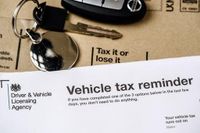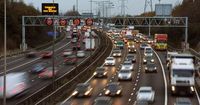UK motorists are preparing for significant changes to car tax regulations as the DVLA implements new rules starting April 1, 2025. These changes will see many drivers facing increased costs, particularly those with petrol, diesel, and electric vehicles (EVs). The new regulations include a rise in the standard road tax rate, the introduction of new taxes for EVs, tax increases for low-emission vehicles, and a doubling of first-year rates for higher-polluting new cars.
Richard Evans, head of technical services at webuyanycar, emphasized the urgency for drivers to act before the deadline. He stated, "The tax changes indicate that the cost of electric motoring is set to rise. However, EV drivers are currently free from road tax and can avoid any charges for a further year – but time is running out!" He encouraged drivers to re-tax their EVs before March 31 to save £195, as this would allow them to enjoy another year of tax-free motoring.
From April 1, 2025, the standard annual road tax rate will increase from £190 to £195 for cars registered between April 1, 2017, and March 31, 2025. This increase will apply to millions of drivers across the UK. Additionally, all EVs will lose their road tax exemption, which has been in place until now. New EVs registered after this date will incur a £10 showroom tax in the first year. Furthermore, any EVs with a list price exceeding £40,000 will be subject to an additional £425 annual charge, known as the "expensive car supplement," for five years starting from the second year of ownership.
For those driving low-emission vehicles producing between 1 and 50 g/km of CO2, the first-year road tax will rise from £10 to £110, marking a staggering 1,000% increase. Similarly, the first-year road tax for vehicles emitting 51-75 g/km will increase from £30 to £130, a 333% hike. For petrol and diesel vehicles producing over 76 g/km of CO2, the first-year tax will double, with the highest emissions band (255 g/km or more) facing a hefty first-year tax of £5,490.
John Cassidy, Managing Director of Sales at Close Brothers Motor Finance, expressed concerns regarding the impact of these changes. He remarked, "The decision not to reverse plans to apply Vehicle Excise Duty (VED) to electric vehicles from April will be a difficult one to stomach for motorists. Applying VED to EVs provides one less incentive for buyers to make the switch." He pointed out that the high upfront costs of EVs, coupled with poor charging infrastructure and rising electricity bills, could deter potential buyers.
Despite the looming tax increases, some experts believe that older electric vehicles may still offer an attractive option for budget-conscious buyers. Evans noted that owners of EVs first registered before April 2017 will benefit from the lowest annual road tax rate of just £20. This makes older EVs appealing for those looking to save on running costs.
The changes to the UK's Vehicle Excise Duty (VED) were initially announced in the Autumn Budget last year, and they reflect the government's intention to align tax with inflation and create a level playing field between EVs and traditional internal combustion engine vehicles. However, the impact of these changes is causing concern among motorists, especially as private consumer demand for EVs has fallen to levels not seen since the pandemic. According to the Society of Motor Manufacturers and Traders (SMMT), only one in ten private buyers opted for an electric model in 2024.
As the new tax regime approaches, many are bracing for the financial implications. The rise in road tax rates is not only a financial burden but may also hinder the government's goals, such as the Zero Emission Vehicle (ZEV) Mandate and the proposed 2030 ban on new petrol and diesel vehicles. Cassidy cautioned that the government’s targets could become harder to achieve as the incentive to switch to electric vehicles diminishes.
In summary, the upcoming changes to car tax regulations in the UK are set to affect millions of drivers, with significant increases in road tax rates for all vehicle types. The introduction of taxes on electric vehicles, which were previously exempt, has sparked debate about the future of EV adoption in the country. As motorists prepare for these changes, many are left wondering how they will manage the increased costs amid ongoing economic pressures.









